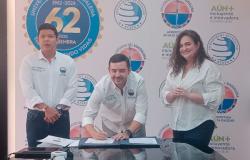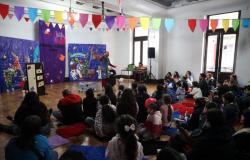After the successful experience for more than twenty years on the Island of Juan Fernández, the same model is being executed in Valparaíso. In addition to clinical and educational intervention in the school community, it includes research work developed by the UV.
The “Adding Smiles” Program, which is being developed at the Blas Cuevas School in Valparaíso, contemplates clinical and educational intervention for all its students from first to eighth grade. In addition, the Pediatric Dentistry specialty of the Faculty of Dentistry of the University of Valparaíso is carrying out a study to evaluate the initial condition of the students and monitor the results over time, providing precise data on the impact of the program. in the oral health of this school community.
This was stated by Mónica Quevedo, a dentist at the Plaza Justicia Clinic of the Valparaíso-San Antonio Health Service, who successfully implemented an oral health program in Juan Fernández, significantly improving dental health rates after 25 years of work on the island. Upon her return to Valparaíso she was asked to replicate the model in a school with similar characteristics to those she found in Juan Fernández.
“I worked in Juan Fernández since 1998, in a population greatly affected by the lack of dentists, where only a few operatives helped patients with pain,” explained the dentist, adding that “it was necessary to carry out very strong preventive and educational work. We invite the authorities to join a joint work network, because this cannot be done alone,” she stated.
Mónica Quevedo stressed the importance of collaboration: “For work to give good results in a community, it has to be with the sum of many people, especially with children. Therefore, work with the school, the authorities and the community in general was crucial.
The model designed by the academic and her team together with the community included a clinical and an educational module. “The clinical module was implemented through the clinic, with the Ministry of Health contributing its share, while the educational module was developed together with Junaeb to teach children the importance of self-care and oral health,” she explained.
Likewise, he noted that “in addition, a school toothbrush was installed, which gives children the opportunity to brush their teeth and maintain good oral hygiene after important meal events, such as breakfast and lunch during a full school day.” .
After 25 years of working in Juan Fernández and observing significant improvements in oral health indices, Mónica Quevedo moved to Valparaíso. “The Valparaíso-San Antonio Health Service gave me the opportunity to implement this model in a school with characteristics similar to those of Juan Fernández,” he said, revealing that “here I found myself with the pleasant surprise that it is a very motivated educational team. and committed to his children, which is giving very good results.
The dentist highlighted that “the participation of the University of Valparaíso is crucial to measure the impact of the oral health model that we are implementing. Your collaboration will allow us to evaluate the initial condition of the children and monitor the results over time, providing accurate data on the impact of the program on oral health. Together with Professor Eduardo Onetto and his resident student, we will dedicate two or three days to evaluating the general oral health status of all the children. The program will remain at the school throughout the year, ensuring continuous and systematic intervention.”
He added that “we hope that, together with the educational community, we will achieve significant success in children’s oral health. Our goal is that at the end of the program, children can be discharged from the office and maintain good oral health. The real success will be seeing children free of cavities next year, with good hygiene and empowered self-care.”
For his part, Professor Juan Eduardo Onetto, director of the Pediatric Dentistry Specialty Program and academic at the UV Faculty of Dentistry, pointed out that “for the University of Valparaíso, and specifically for the Faculty of Dentistry and the Pediatric Dentistry program, it is It is extremely important to collaborate on this very interesting project. Basically, we are replicating a successful model that has worked for more than twenty years on Juan Fernández Island, led by Dr. Quevedo, through the Health Service. For the University, it is a privilege. and an opportunity to collaborate and conduct independent research, which can establish the basis for obtaining better evidence about the efficiency of the project.”
The dentist explained that “in this initial stage, our work will consist of carrying out an epidemiological survey, which means identifying and detecting the levels, depth and susceptibility of cavities in schoolchildren. Once the exams of all the students of the Blas Cuevas School are completed, we will enter a stage of education, motivation and modulation. Currently, we are in the process of collecting information from point zero—or the beginning of the program—and then, in a year, carry out a new study that allows us to compare how the process has improved or stopped over time. We hope to have a long collaboration of about four to five years, since the longer we can evaluate annually, the better data we will obtain.”
Likewise, Juan Eduardo Onetto revealed that “it is a really interesting challenge. Although the model was extremely successful on Juan Fernández Island, it is an island context. The challenge, and where we are collaborating with Dr. Quevedo and the Health Service, is to see what adaptations can be made to this pilot so that it can later be replicated in schools in the Valparaíso Region. “If we manage to scale it, it will have great significance at the national level.”
The academic explained that the Pediatric Dentistry Specialty, through its resident, second-year student Jacqueline Rodríguez, is currently carrying out data collection. His research work focuses on the evaluation of an educational intervention in basic courses in vulnerable schools.
The director of the Blas Cuevas School in Valparaíso, María Elizabeth Bendel, expressed: “We are extremely pleased and happy with this project, since we are the only public service school in Valparaíso with this privilege. The initiative was born from Mónica Quevedo, who He visited one day and made this wonderful proposal. With an enrollment of one hundred highly vulnerable students, the provision of this service within the establishment is a great benefit for our students. This program is fantastic for our children because they will receive dental care without losing hours. “Everyone is fascinated by the initiative. The teamwork with the teachers has been very positive in general. It has generated spaces for bonding and has been tremendously enriching for everyone.”
Finally, Emiliano Martínez, seventh grade student and president of the Blas Cuevas School Student Center, said: “I really think this initiative is very good, because it helps many students take care of their teeth. Many do not know the correct technique for brushing or how often to go to the dentist. This experience is very good not only for the students but for the entire school, in general, since it helps us all in everything that has to do with oral hygiene.”


Note: Pamela Simonetti / Photos: Matías Salazar / Video: Felipe Olguín









